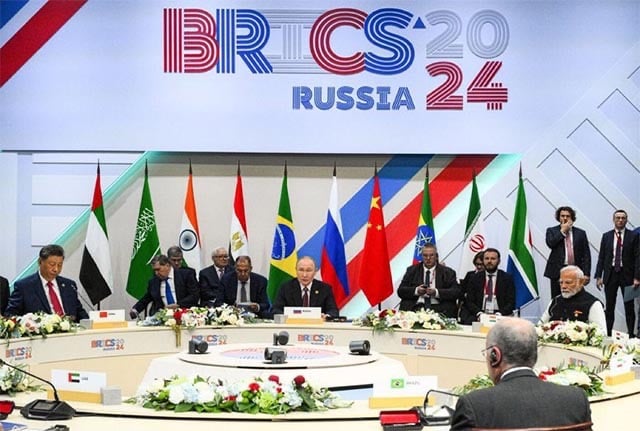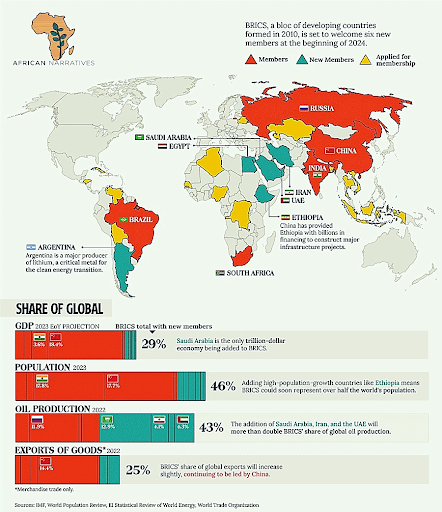BRICS Expansion in Africa: Opportunities and Challenges Amid Global Shifts
Explore the opportunities and challenges of BRICS expansion in Africa. African Narratives analyzes the economic, political, and developmental implications
Nashwa Abdelnaby, Political Researcher
2/7/20253 min read


The global landscape is shifting. As the BRICS group gains prominence, its relationship with Africa is becomingincreasingly significant. Here at African Narratives, we've been closely examining this evolving dynamic, and our latest study, authored by Political Researcher Nashwa Abdelnaby, delves into the opportunities and challenges that thispartnership presents for the continent.
Africa's Rising Role in BRICS
Since South Africa joined BRICS in 2010, the group's focus on Africa has intensified, particularly in the realm ofeconomics and trade. More recently, the inclusion of Egypt, Ethiopia, and Nigeria has amplified Africa's voice within BRICS, paving the way for enhanced collaboration in trade, investment, and infrastructure development.
BRICS is poised to help Africa tackle some of its most pressing challenges, including poverty, unemployment, and food insecurity. By facilitating access to new markets and fostering cooperation in areas like innovation and green energy, BRICS can contribute to the continent's sustainable development goals.
Moreover, BRICS provides a platform for African nations to strengthen their economic and political standing on the international stage, allowing them to play a more prominent role in shaping global policies that affect them directly.
Opportunities Abound
The expansion of BRICS presents several potential benefits for Africa:
Enhanced Economic Cooperation: BRICS offers opportunities to strengthen economic partnerships with major global players, attracting investments in vital sectors and fostering new sources of development financing.
Promoting Intra-African Trade: BRICS can support the African Continental Free Trade Area (AfCFTA), fostering economic and social transformation across the continent.
Alleviating Economic Pressures: As BRICS countries explore alternatives to the US dollar in trade and investment, African nations could reduce their reliance on the dollar and mitigate economic pressures.
Access to Development Funding: The New Development Bank (NDB), established by BRICS, offers a promising alternative source of funding for development projects, with fewer conditionalities than traditional Western institutions.
Navigating the Challenges
However, the path forward isn't without its hurdles. Our study highlights several challenges that need to be addressed:
Internal Contradictions within BRICS: Divergent economies and foreign policy orientations among BRICS members could complicate coordination and create conflicting interests.
Coordination of Financial Measures: The ambition to create a common BRICS currency faces significant obstacles due to the economic disparities within the bloc.
Geopolitical Tensions: The expansion of BRICS could be perceived as a challenge to Western powers, potentially intensifying geopolitical tensions.
Debt Sustainability: Some BRICS members are major creditors to African nations, raising concerns about debt sustainability and the potential for debt distress.
Focus on Productive Investment: BRICS declarations often emphasize infrastructure and manufacturing, but concrete action in these areas has been limited.
Trade Barriers: Unfair trade deals could hinder manufacturing and productivity growth in Africa, and the expansion of BRICS could lead to fragmentation within the continent.
The Way Forward: A Call for Strategic Engagement
As Africa navigates this evolving landscape, it's crucial to address internal stability, define clear policy priorities, and establish balanced relationships with BRICS partners. At the same time, BRICS members should focus on strengthening their core tools and ensuring mutual benefits for all participants.
Our study emphasizes that the success of this partnership hinges on the ability of African nations, working collectively through the African Union, to address these challenges strategically and seize the opportunities that BRICS presents.
Nigeria's Role as a Partner
In a significant development, Nigeria has been accepted as a "partner country" within BRICS, a move that could reshape regional trade, development, and geopolitical strategies in West Africa. This partnership aligns with Nigeria's aspirations for inclusive growth and its desire to play a more active role in shaping a fairer global economic system.
Conclusion: A Pivotal Moment for Africa
The expansion of BRICS represents a pivotal moment for Africa. While the opportunities for economic growth and increased global influence are significant, it's essential to acknowledge and address the inherent challenges. By fostering balanced relationships, promoting regional cooperation, and prioritizing sustainable development, Africa can harness the power of BRICS to shape its own narrative and secure a brighter future.
Learn More
For a deeper dive into the opportunities and challenges of BRICS expansion in Africa, we invite you to download the full study: [Here]


Empowerment
Amplifying African voices for sustainable progress together.
Contact US
Growth
Street No. 3281, N'Djamena, Republic of Chad.
© 2024. All rights reserved.